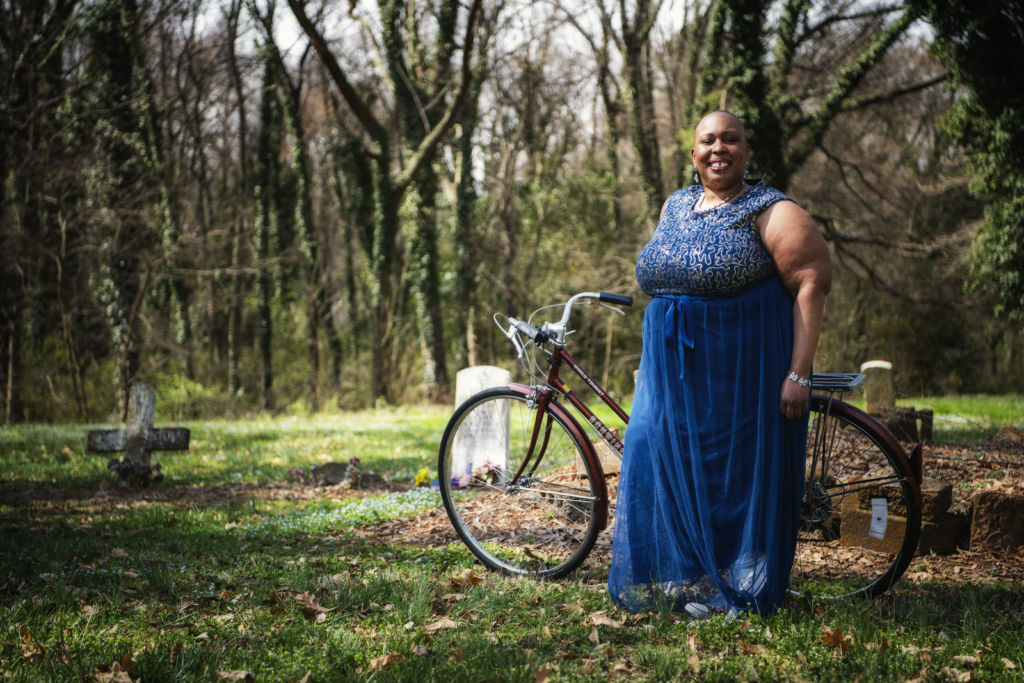Local Educator, Bike Tour Creator Doesn’t Do Limits
By JONATHAN MCFADDEN
Don’t put limits on Kenya Templeton. She doesn’t believe in them and will do her best to defy them anyway.
That’s because she’s spent much of her career honing her various artistic talents and working stints across an array of industries that include theatre, marketing, fashion and retail. Today, she teaches cyclists about natural health, the arts and Charlotte’s historic Black neighborhoods while mounting an orange RadWagon 4 bicycle she calls Sidola.
So, it’s no surprise she’s one of four Mecklenburg County creatives to receive the Arts & Science Council’s Emerging Creators Fellowship this year. The grant awards $5,000 to recipients who will use the money to scale their enterprises and start new projects.
Templeton, 47, said she plans to use her fellowship funds to bolster what she’s already doing with Velo Griot, an educational bike tour she started after noticing how few people of color rode bikes along the county’s parks, trails and greenways.
“It’s about education in areas that most people of color don’t get,” Templeton said of her tours. “The Black history tour is something I’ve always been doing. This grant is supporting me with the time and money to build the mobile classroom that will go on the back of the bikes.”
She’s still researching those logistics but said the mobile classroom will feature a robust curriculum touching on topics that range from diabetes, women’s health and children’s asthma to dance, drama and the arts.
“I’m going to bring the arts to those who don’t have the arts in their neighborhood,” she said. “It can look like a concert. It can look like us drawing mandalas. It could be us doing nature walks or putting on a play.
“I don’t deal with limits,” added Templeton, who also works as the customer care and market manager for Viva Raw in the 7th Street Public Market. “As soon as you tell me there’s a limit, I’m going to show you that you’re wrong.”
A life without limits
Growing up in Statesville, Templeton attended North Carolina State University, where she continued pursuing her childhood passion for singing and theatre. She was later “blackballed” after a choir instructor told a classroom of students that if they didn’t sing like Kenya, they shouldn’t expect solos. She didn’t sing or act for another 20 years, instead spending that time working in visual merchandising and marketing for boutique stores and natural health companies like GNC and Great Earth Vitamins.
Sometime after moving to New York City, her apartment caught on fire and she was involved in two major car wrecks, one of which totaled her car. She returned to North Carolina — first to Statesville, then to Davidson and finally to Charlotte in 2012 when she transferred to the local store for Healthy Home Market.
That’s when bike tours came into play. One day as she rode her bike to work, she fell and noticed a plaque on the sidewalk dedicated to the Mecklenburg Investment Company Building on South Brevard Street. She learned about its rich history as one of the last vestiges of Brooklyn Village, Charlotte’s largest Black neighborhood until it was razed to the ground during urban renewal in the 1960s.
The more she learned about Charlotte’s Black communities, the more she shared with people who joined Queen City EZ Riders Slow Biker Gang, a cycling group she and a friend started to encourage more people of color to ride bikes.
“We started riding in our own neighborhoods,” she said, “and I’d point out things I knew, little things in history.”
People liked it, and so five years ago she began to formally host local Black history bike tours. She later branded the tours as Velo Griot (“Velo” is French for bike and “griot” refers to West African storytellers) and expanded her topics to include lessons on health and the arts.
“Part of the reason I do the tours is so people who are not Black and are not indigenous can learn why people are angry that they’re not learning full history in history classes,” she said. “The suppression of that history plays into racism.”
And it’s not just Black history riders are learning. Kenya ensures cyclists know that Charlotte was once home to indigenous peoples.
“It’s not just about the erasure of Black people. It’s about the erasure of people who were before any of us got here,” she said. “We can’t just depend on everybody else to tell our stories. The stories often being told about us aren’t correct.”
Driving opportunities
So, why tell these stories from a bike?
“I see a bike as an opportunity,” she said. “A bike is an opportunity to increase lung capacity. A bike is a means of getting around. A bike (creates) potential for upward mobility. A bike is an answer to mental health.”
What biking is not, she said, is a gimmick to promote Velo Griot.
“Cycling has saved my life – literally and figuratively,” she said. “I’m a plus-sized woman. Most cyclists look at me and say, ‘She can’t bike.’ I’m also a woman born with congenital abnormalities. I have a fused ankle. It’s harder for me to walk around, but it’s way easier to bike.
She adds: “My mother, in trying to protect me, didn’t put me into sports. I put myself into sports. Like I said, I don’t do limits.”
Interested in a bike tour?
Follow Kenya on Facebook at “Kenya Templeton Does” or Instagram at Kenya_Templeton_Does to discover how to join or schedule a tour.


